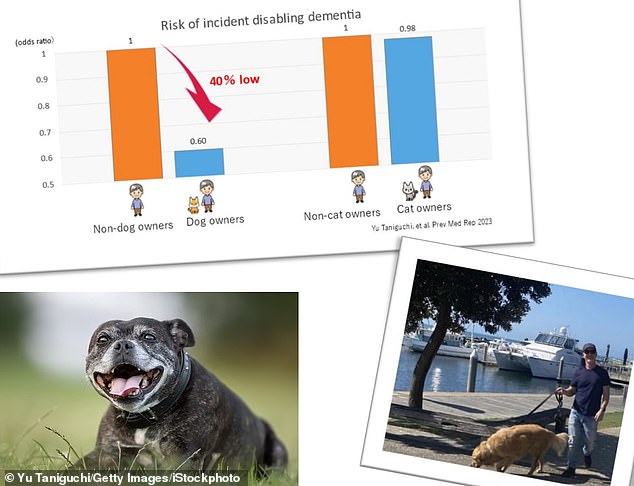Why a dog is your BRAIN’S best friend: People over the age of 65 who own a pooch are 40% less likely to develop dementia, study finds
We all know that dogs are man's best friends, and now research suggests this may be due to the health benefits dogs provide to our brains.
Scientists in Japan found that owning a dog of any breed – but not a cat – reduces the risk of elderly people developing dementia by 40 percent, compared to people without a dog.
Having a dog increases the likelihood of getting out of the house, which leads to more interactions with other people and in turn trains the brain, they say.
This has a 'suppressive effect' on the development of the debilitating condition, which affects more than 55 million people worldwide.
Previous research also suggests that dog ownership among older adults has a protective effect on frailty, disability, and death from any cause.
Owning a dog can reduce the risk of developing dementia by 40 percent, researchers in Japan report (stock image)

Researchers in Japan have found that owning a dog of any breed can reduce the risk of dementia by 40 percent, compared to people without a dog.
The new study was led by researchers at the Tokyo Metropolitan Institute of Gerontology in Japan, who say it is the first to show that dog ownership protects against dementia.
“Dog owners with an exercise habit and without social isolation had a significantly lower risk of disabling dementia,” they say in their paper.
'The care of dogs can contribute to the maintenance of physical activity, including having an exercise habit, and social participation, even in the face of restrictions on interactions such as those experienced during the Covid-19 pandemic.'
Dementia is an umbrella term for symptoms that occur when brain function declines, but Alzheimer's disease is the most common form of dementia.
Many dementia conditions, including Alzheimer's disease, are associated with an abnormal buildup of proteins in the brain.
But exercise reduces this buildup while also maintaining adequate blood flow to the brain and encouraging the growth and survival of brain cells.
In addition to getting enough physical activity, staying mentally and socially active is another common health advice to prevent dementia.
Mental activity helps build your 'cognitive reserve': the brain's ability to cope and keep working.

Previous research also suggests that dog ownership among older adults has a protective effect on frailty, disability, and death from any cause
For the study, researchers recruited 11,194 older adults in Japan, between the ages of 65 and 84.
Participants, who were all physically and cognitively independent at the start of the study, were sent questionnaires to answer whether they had a cat or a dog.
They were also asked about the types of exercise they did more than once a week, from walking and running to yoga swimming, cycling and stretching.
About four years later, their health was assessed, including the development of any dementia conditions.
For the entire sample, the researchers calculated the 'odds ratio', which indicates the risk of developing dementia, for both dog and cat owners.
After adjusting for background factors, the odds ratio was 0.6 for dog owners, but much higher – 0.98 – for cat owners and 1 for those who did not own dogs or cats.
As expected, the participants' amount of exercise also had an effect on their risk of dementia – but this made the all-important difference for dog owners.
Dog owners with a regular exercise habit had a low risk of dementia of 0.37 compared to people without dogs who did not get any exercise.

Dementia is a term used to describe the symptoms that occur when there is a decline in brain function (stock image)
But dog owners with no exercise habit had a much higher odds ratio of 0.89 compared to people with no exercise habits.
And current dog owners without social isolation had an odds ratio of 0.41 compared to people without dogs who were socially isolated.
In other words, dog owners with an exercise habit and no social isolation have the lowest risk of disabling dementia.
However, the results show that having a dog does not protect against the disease if you get little exercise and are socially isolated, the team warns.
“Dog owners without daily lifestyle habits related to dog care, such as no exercise habits and social isolation, did not experience any positive effects related to dementia prevention,” they write.
The researchers note that the share of dog and cat ownership in Japan is lower than that in Western countries, such as the US.
“It will therefore be important to assess whether the relationships found in Japan are also present in Western and other countries,” they say.
According to the World Health Organization (WHO), there are approximately 50 million people with dementia worldwide and there are almost 10 million new cases every year.
A 2021 study estimated that global cases of dementia will nearly triple to over 152 million by 2050, due to an aging population.
The highest increases in dementia prevalence are expected to occur in eastern sub-Saharan Africa, North Africa and the Middle East, according to experts from the University of Washington.
